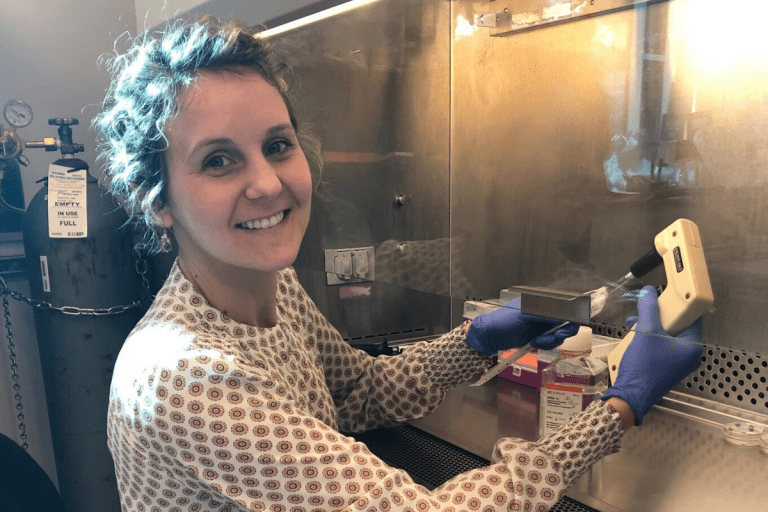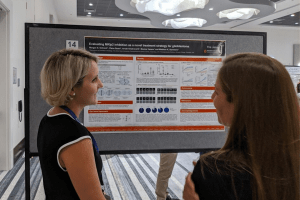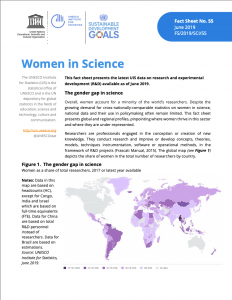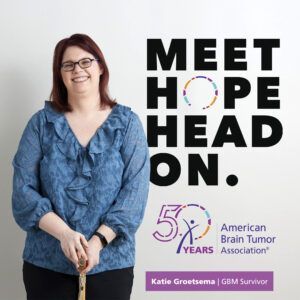
Morgan Schrock, DVM, PhD’s first career was a veterinarian, but she later found her life-long love in brain tumor research. As a postdoctoral scientist at The Ohio State University Department of Radiation Oncology, Morgan is now using her veterinary background to advance the understanding of brain tumors in humans by improving our knowledge of brain tumors in pet dogs.
Morgan explained that a traditional research model involves testing new therapies in mice before advancing to human clinical trials. However, mouse models are not providing enough accurate information in how therapies would affect people, because it’s been found that approximately 95 percent of cancer drugs that enter clinical trials do not make it past early phases of testing in people. This is because mice are different from the human body. Dogs, however, may provide more accurate data in terms of efficacy or toxicity in clinical trials.
“The metabolism of a dog is closer to humans, than a mouse. So, I’m working on an emerging field of research called comparative oncology, where we’re trying to understand cancers in other animals, like dogs, so we can apply more accurate information to humans,” said Morgan.
When Morgan was a veterinarian in private practice, she referred pet dogs to Ohio State University Veterinary Medical Center for clinical trials involving pet dogs with cancer. These veterinary clinical trials helped provide treatments and extend the lives of the dogs, while gathering important data on novel cancer treatments for human patients.
I gravitated towards brain tumor research because often times patients are enduring one of the most aggressive cancers that we know.
Morgan Schrock, DVM, PhD
Research to Curb a Formidable Disease
At the very start of her brain tumor research career, Morgan became attracted to a project that focused on new therapies for glioblastoma (GBM) patients.
“I gravitated towards this type of research because often times glioblastoma patients are enduring one of the most aggressive cancers that we know,” said Morgan. “And there’s a lot of work that still needs to be done for these patients, because it is such a formidable and prolific disease.”
 In 2018, Morgan was a recipient of the American Brain Tumor Association Basic Research Fellowship for her research project, “A Novel Antimitotic in Glioblastoma.” Her research project focused on the mitotic kinesin-like protein 2 (MKlp2), a protein that causes GBM tumor cells to divide and multiply quickly. Morgan aims to uncover the potential therapeutic effects of blocking the protein when combined with standard GBM therapies. A second goal of the project is to learn more about how MKlp2 behaves in naturally-occurring canine cancers to determine whether treating brain tumors in dogs can serve as a preclinical study to testing MKlp2 inhibitors in GBM human patients.
In 2018, Morgan was a recipient of the American Brain Tumor Association Basic Research Fellowship for her research project, “A Novel Antimitotic in Glioblastoma.” Her research project focused on the mitotic kinesin-like protein 2 (MKlp2), a protein that causes GBM tumor cells to divide and multiply quickly. Morgan aims to uncover the potential therapeutic effects of blocking the protein when combined with standard GBM therapies. A second goal of the project is to learn more about how MKlp2 behaves in naturally-occurring canine cancers to determine whether treating brain tumors in dogs can serve as a preclinical study to testing MKlp2 inhibitors in GBM human patients.
Experiences in the Lab
 In North America, approximately 33 percent of researchers are women.1 Diversity in the scientific community is an ongoing area for improvement, including addressing the challenges of balancing a rigorous career in academic research and personal life goals, like starting a family.
In North America, approximately 33 percent of researchers are women.1 Diversity in the scientific community is an ongoing area for improvement, including addressing the challenges of balancing a rigorous career in academic research and personal life goals, like starting a family.
“I believe we should create a more family-friendly workplace, including financial awards for female trainees to use toward supplementing childcare costs, having on-campus daycare, and creating safe, kid-friendly spaces for children to spend time on evenings and weekends when parents must work in the lab,” shares Morgan. “I also think the promotion of female scientists with families will help send the message that female trainees don’t need to decide between an academic career or a family. These two worlds can flourish simultaneously in a supportive environment.”
Supporting Early-Career Scientists and Novel Ideas
The ABTA has awarded more than $32 million in research grants to scientists from around the world. Grants support both established and new scientists in discovering more about the causes, effects, diagnosis and treatment of brain tumor.
Learn more about the ABTA Research program and grant opportunities.
1. UNESCO Institute for Statistics (UIS). “Women in Science: Fact Sheet No. 55. June 2019.” Accessed on 3/5/20 at http://uis.unesco.org/sites/default/files/documents/fs55-women-in-science-2019-en.pdf


















